There’s no denying Spotify and YouTube have been the streaming giants in music and video, respectively, over the last decade. These industries have generated billions of dollars in revenue and technologically enhanced the entertainment experiences of consumers worldwide.
However, the downside of the so-called platform economy is the little money creators pocket after expenses from most services. For instance, research suggests an artist earns $7000 for every million streams on Spotify.
Yet, after the record companies take their cut, along with other costs, the artist may only be left with about half the revenue or less. Similarly, on YouTube, with 1 million views, creators can expect to make about $2000 with an average CPM (cost per thousand impressions) of $2.
One solution where creators can keep the majority of the earnings is decentralization through cryptocurrencies, more specifically blockchain technology. Through this avenue, artists and video makers can better monetize their work and get paid directly from those who enjoy it without any middlemen.
Decentralized platforms will also not demonetize their creators and censor any content. Moreover, one can earn right away without meeting any special requirements, as with platforms like YouTube.
The limitations we’ve mentioned with centralized platforms only scratch the surface, prompting music artists and video creators to seek greener pastures.
So, without further ado, let’s explore the top 5 decentralized alternatives to music and video streaming.
Top 5 decentralized alternatives to Spotify and YouTube
The first three services in this list are platforms for music streaming, while the last two are for video streaming.
Emanate
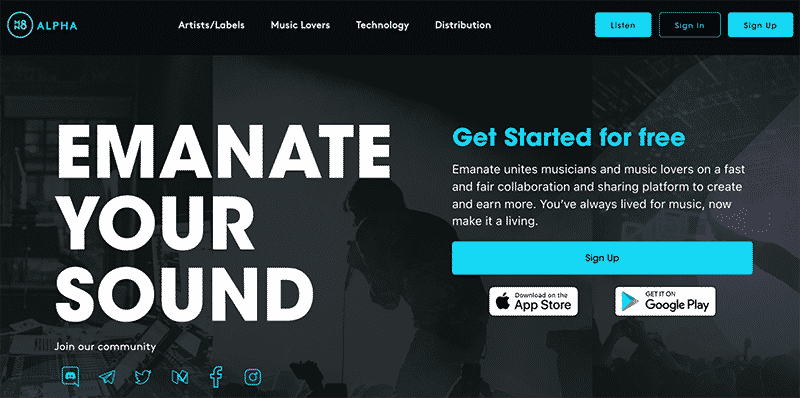
Founded in 2017, Emanate is one of the most recognized blockchain-based decentralized music streaming platforms allowing musicians and record companies to earn in cryptocurrency through the EOS-powered EMT token.
The Australian-based service’s mission is fostering ‘an evolution in music distribution.’ Emanate is for audio data exchange across platforms, letting artists have a closer connection to fans and, most importantly, paying artists instantly without any red tape or need for record labels.
As with existing streaming platforms like Spotify and iTunes, users pay a monthly fee for the privilege to stream and download complete tracks.
Audius
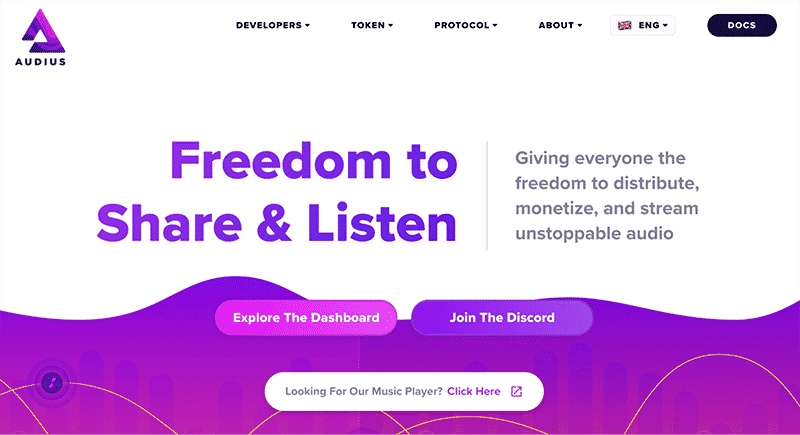
Audius is another decentralized music streaming platform launched in 2020. Established in California, the service is part of the army of blockchain-based streaming products aiming to connect artists directly to fans through unrestrictive compensation.
Like several other platforms, listeners and artists are rewarded with the aptly-named AUDIO coin for their engagement. As with any utility token, the hope is for participants to receive even bigger profits through price appreciation as the service grows.
According to CoinMarketCap, the ERC20 token is ranked #107 in the list of most traded cryptocurrencies. Audius has already received million-dollar investments from big-names artists like Nas and Katy Perry.
Presently, listeners can stream songs for free. However, this might change in the future, along with the possibility of staking AUDIO and other features to make this budding service better.
Potentiam
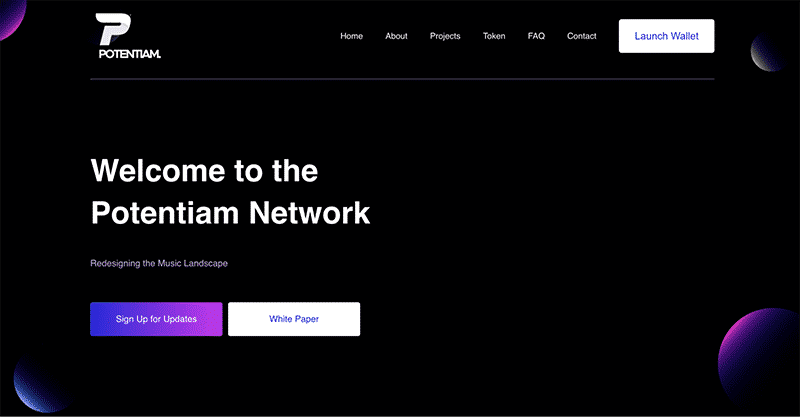
Founded in 2017, Potentiam is different from Audius and Emanate in that it’s not just a streaming service. Instead, Potentiam is a blockchain-focused network connecting listeners, musicians, and other key players in the industry ranging from marketers to content writers.
In this way, Potentiam desires to reward everyone in the music value chain. The platform aims to deliver interactions among artists and consumers through a rewards ecosystem consisting of royalty-free streaming, live performances, exclusive releases, and more.
All this activity will, of course, occur without any intermediaries. The platform’s native currency is the Ethereum-powered PTM token used for rewarding all parties involved for their participation.
Theta
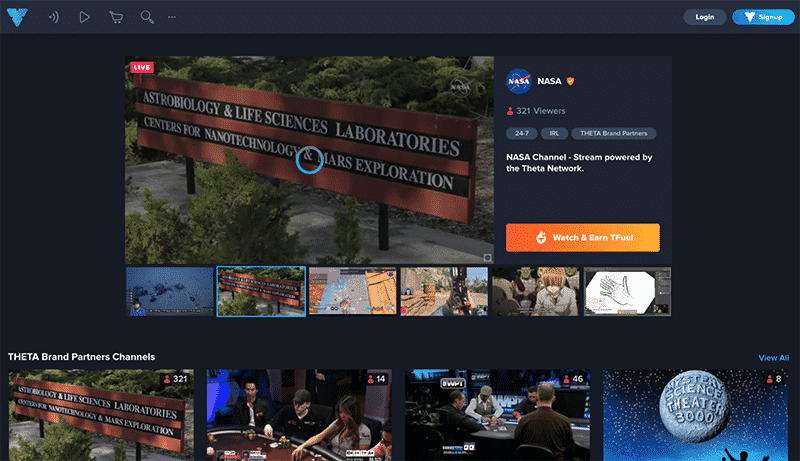
Theta is one of the most prominent blockchain-based video streaming platforms. It was co-founded in 2018 by Jieyi Long and Mitch Liu and subsequently launched in May 2019.
Theta’s mission is to improve viewing quality and provide greater monetization in video streaming. The platform supports a number of content verticals such as movies, TV, music, esports, and live peer-to-peer on its flagship product Theta.tv.
One of the main utility tokens for Theta is TFUEL, secured by Theta’s proprietary blockchain. Users and creators can receive and exchange TFUEL based on their engagement in the platform.
According to CoinMarketCap, THETA (the governance token) and TFUEL (the utility token) is the 39th and 93rd most traded coins, respectively.
DTube
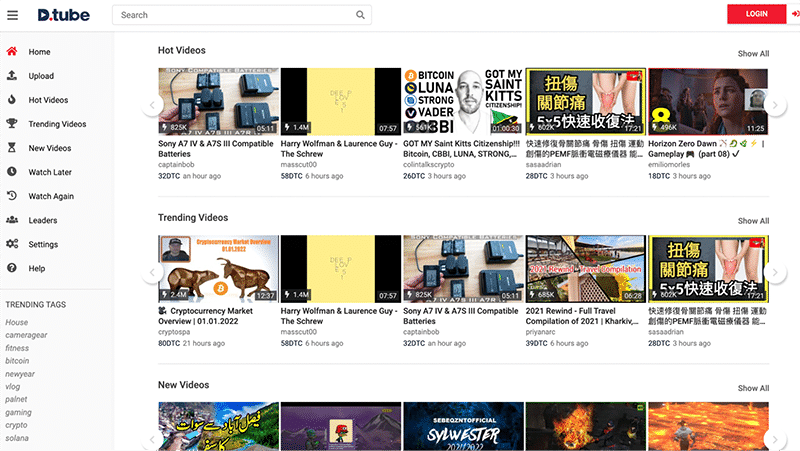
DTube (Decentralized Tube) is a STEEM and IPFS-powered, peer-to-peer video streaming service. When one looks at the website, it might be mistaken for the real YouTube, but this is where the similarities end.
Launched in July 2016, DTube allows anyone to create and curate videos, post comments, and upvote content with the incentive of earning in STEEM. DTube is worlds apart in difference compared to its predecessor.
Firstly, there are no ads on DTube, no biased algorithms, and the platform is censorship-resistant. Another interesting feature of this streaming service is that no video can be edited or deleted once uploaded.
Overall, DTube genuinely welcomes those seeking a YouTube substitute without all the fuss.
Final word
The technological revolution in the entertainment industry has been both a blessing and a curse. On the plus side, it’s made music and video streaming a breeze for fans. Sadly, the downside has been that creators have found it quite challenging to get their fair profit share.
Although the platforms we’ve listed in this article are not as popular as their counterparts like Spotify and YouTube, they provide numerous critical benefits such as privacy-centric systems, see-through terms and conditions, unbiased search algorithms, open-source development, and, ultimately, decentralization.
Principally, content creators can be remunerated without reporting to any corporation. The hope is, of course, such alternative services will continue to be more widely used.
In this way, everyone can reap the benefits of blockchain innovation, making audio and video content created, sold, and managed in the fairest method possible.



